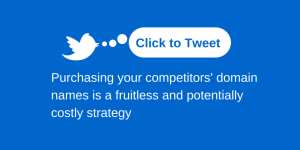
UPDATE: we've expanded the ideas in this post! Check out our more recent article on whether or not newly released domain extensions can help your SEO.
An article published yesterday on RichmondBizSense.com generated a stir among Richmond business owners and online marketers. The article, 'The domains were available' is about how a Goochland area firm purchased variations of their competitors web addresses (domains) with different extensions (e.g. .biz instead of .com). The main focus of the article was on the ethics of such a strategy. Ethics aside, I think it's important for everyone to understand why this is a fruitless and potentially costly strategy (a point the author unfortunately omitted).
A fruitless and potentially costly strategy
Here's how it works (I've substituted the actual names for fictional ones):
Someone is looking to have their yard professionally landscaped. Their neighbors used Pristine Lawn Service and raved at the quality and price of their work so they decide to look them up online. They go to Google and search 'Pristine Lawn Service Richmond.' Among all the Google search results is www.pristinelawns.biz. As a person looking for the Pristine Lawn company, this seems to be exactly what I'm looking for. I click the listing, but instead of landing on the Pristine Lawns website, I arrive at the Awesome Yards website.
And that's it: the Awesome Yards company has captured people looking for their competitor by purchasing a variation of their domain.
Taking advantage of redirects
If the Awesome yard example above sounds like a strategy you're interested in using for your business, then allow me to break down two common ways to exploit website redirects and the accompanying “world of hurt” you might be setting yourself up for:
One way: You buy thousands of keyword-rich domain names (web addresses) and have them redirect to your site. For example, my business is LeoneWidgets.com and I market to Richmond, VA. I could buy RichmondWidgets.com, WidgetsinRichmondVA.com, BestRichmondWidgets.com, and have them all just redirect back to my site. This would be like receiving thousands of great new links (if you don't understand how search engines rank sites, having a link to your site is analogous to getting a vote or endorsement for your site. If the link has your keyword within it, the link (or vote), looks even better.)
Another way (The Awesome Lawn Method): You buy several domain names that will attract visitors to click on them when they display in Google. These can be competitor names, other relevant sounding domain names, etc.. Using the above example, I might buy variations of my competitors' sites, like DansDoodads.biz, EricsThingamajigs.biz, PaulsKnicknacks.net, etc. The idea is these domains will get ranked throughout the search engines when someone searches my competitors. So, when someone thinks they are going to my competitor, they actually arrive at LeoneWidgets.com. Note: this will do nothing to rank LeoneWidgets.com higher in the search engine. Instead, I'm just taking up more real estate.
Penalties
The most glaring problem with both of these methods is that they are very, very easy to detect for search engines. Google, for example, is an accredited registrar (meaning you can purchase domains though Google). This provides Google access to domain ownership information so they know who owns what and what they're doing with it. Secondly, search engines like Google and Bing are only as good as their search results. As such, they dedicate some of their most brilliant minds to finding and identifying deceptive practices. If the search engines think you are trying to get more real estate than you are fairly entitled to, they will catch you.
Money better spent elsewhere
Domains are cheap. But buying them in bulk as a search engine strategy can quickly add up to hundreds or thousands of dollars a year. A small price if effective, but the risk you take can easily cost you much more. If you want more rankings and more traffic your effort, time and money can be spent doing things like:
- Optimizing the website for targeted keywords and easy crawling by the search engines
- Writing valuable, resourceful content that can earn links back to your site
- Optimizing local map listings in Google and Bing
The most important takeaway from this story is that a strategy that can be considered deceptive by some probably will be deceptive in the eyes of a search engine. There are so many opportunities to get high rankings and relevant traffic using white-hat methods that it's not worth taking the risk with grey and black hat strategies. Do it the right way and you will be rewarded.
At WebStrategies, Inc, we find the best ways for businesses to be found online by the people most likely to use their products and services. Learn more about our approach to online marketing methods such as search engine optimization (SEO), pay-per-click (PPC), and many other types of inbound marketing methods.
Do you think purchasing competitors' sites is still a good idea? Let us know in the comments section below.






Agree, disagree, or just have something to add?
Leave a comment below.